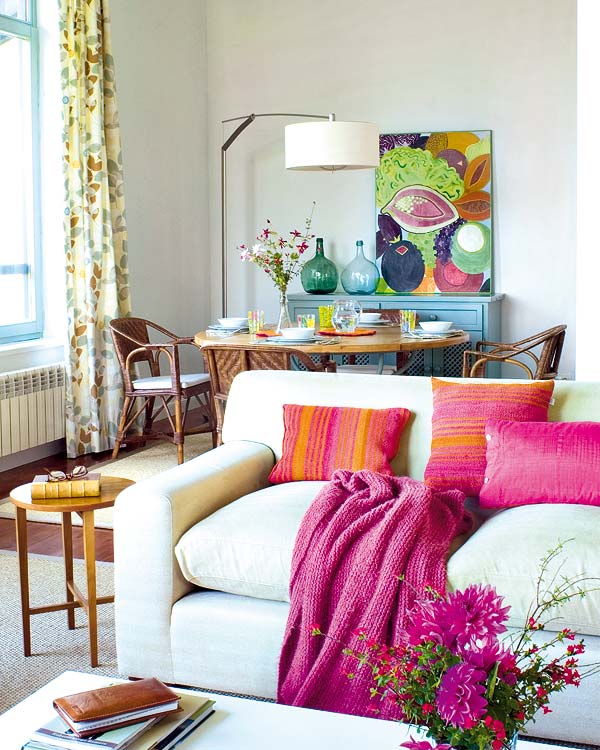
Sunniest
The precious grace of God is made secondary to matters of no real importance; and many, while collecting material for enjoyment, lose the capacity for happiness. They find that their possessions fail to give the satisfaction they had hoped to derive from them. This endless round of labor, this unceasing anxiety to embellish the home for visitors and strangers to admire, never pays for the time and means thus expended. It is placing upon the neck a yoke of bondage grievous to be borne.
Two Visits are Contrasted.--In some families there is too much done. Neatness and order are essential to comfort, but these virtues should not be carried to such an extreme as to make life a period of unceasing drudgery and to render the inmates of the home miserable. In the houses of some whom we highly esteem, there is a stiff precision about the arrangement of the furniture and belongings that is quite as disagreeable as a lack of order would be. The painful propriety which invests the whole house makes it impossible to find there that rest which one expects in the true home.
It is not pleasant, when making a brief visit to dear friends, to see the broom and the duster in constant requisition, and the time which you had anticipated enjoying with your friends in social converse spent by them in a general tidying up and peering into corners in search of a concealed speck of dust or a cobweb. Although this may be done out of respect to your presence in the house, yet you feel a painful conviction that your company is of less consequence to your friends than their ideas of excessive neatness.
In direct contrast to such homes was one that we visited during the last summer [1876]. Here the few hours of our stay were not spent in useless labor or in doing that which could be done as well at some other time, but were occupied in a pleasant and profitable manner, restful alike to mind and body. The house was a model of comfort, although not extravagantly furnished. The rooms were all well lighted and ventilated, . . . which is of more real value than the most costly adornments.
The parlors were not furnished with that precision which is so tiresome to the eye, but there was a pleasing variety in the articles of furniture.
The chairs were mostly rockers or easy chairs, not all of the same fashion, but adapted to the comfort of the different members of the family. There were low, cushioned rocking chairs and high, straight-backed ones; wide, capacious lounging chairs and snug, little ones; there were also comfortable sofas; and all seemed to say, Try me, rest in me. There were tables strewn with books and papers. All was neat and attractive, but without that precise arrangement that seems to warn all beholders not to touch anything for fear of getting it out of place.
The proprietors of this pleasant home were in such circumstances that they might have furnished and embellished their residence expensively, but they had wisely chosen comfort rather than display. There was nothing in the house considered too good for general use, and the curtains and blinds were not kept closed to keep the carpets from fading and the furniture from tarnishing. The God-given sunlight and air had free ingress, with the fragrance of the flowers in the garden. The family were, of course, in keeping with the home; they were cheerful and entertaining, doing everything needful for our comfort, without oppressing us with so much attention as to make us fear that we were causing extra trouble. We felt that here was a place of rest. This was a home in the fullest sense of the word.
A Principle Used in Decorating.--The rigid precision which we have mentioned as being a disagreeable feature of so many homes is not in accordance with the great plan of nature. God has not caused the flowers of the fields to grow in regular beds, with set borders, but He has scattered them like gems over the greensward, and they beautify the earth with their variety of form and color. The trees of the forest are not in regular order. It is restful to eye and mind to range over the scenes of nature, over forest, hill, and valley, plain and river, enjoying the endless diversity of form and color, and the beauty with which trees, shrubs, and flowers are grouped in nature's garden, making it a picture of loveliness. Childhood, youth, and age can alike find rest and gratification there.
This law of variety can be in a measure carried out in the home. There should be a proper harmony of colors and a general fitness of things in the furnishings of a house; but it is not necessary to good taste that every article of furniture in a room should be of the same pattern in design, material, or upholstery; but, on the contrary, it is more pleasing to the eye that there should be a harmonious variety.
But whether the home be humble or elegant, its appointments costly or the reverse, there will be no happiness within its walls unless the spirit of its inmates is in harmony with the divine will. Contentment should reign within the household.
The very best part of the house, the sunniest and most inviting rooms, and the most comfortable furniture should be in a daily use by those who really live in the house. This will make home attractive to the inmates and also to that class of friends who really care for us, whom we could benefit, and by whom we could be benefited.
Consider the Children's Comfort and Welfare.-- It does not require costly surroundings and expensive furniture to make children contented and happy in their homes, but it is necessary that the parents give them tender love and careful attention.
AH 151-154